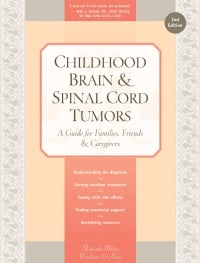Childhood Brain and Spinal Cord Tumors
Checklist for parenting stressed children
A group of parents compiled the following suggestions for ways to parent stressed children.
- Model the type of behavior you desire. If you talk respectfully and take time-outs when angry, you are teaching your children to do so. If you scream or hit, that is how your children will handle their anger.
- Seek professional help (for you and/or your children) for any behaviors that trouble you.
- Teach your children to talk about their feelings.
- Listen to your children with understanding and empathy.
- Be honest and admit your mistakes.
- Help your children examine why they are behaving the way they are.
- Distinguish between having feelings (always okay) and acting on strong feelings in destructive or hurtful ways (not okay).
- Have clear rules and consequences for acting on destructive feelings.
- Teach children to recognize when they are losing control.
- Discuss acceptable outlets for anger.
- Give frequent reassurances of your love.
- Provide plenty of hugs and physical affection.
- Notice and compliment your child’s good behaviors.
- Recognize that the disturbing behaviors result from stress, pain, and drugs.
- Remember that with lots of structure, love, time, and sometimes professional help, the problems will become more manageable.
Every possible grouping of our family has been in therapy at one point or another. We have all done individual therapy, family therapy, and my husband and I did couples therapy. I feel that each of these sessions was a gift to our family. It helped us vent, cry, plan, and forge stronger bonds. We are all happy together many years after our daughter’s cure, and every single penny we spent was worth it.
Our children look to us to learn how to handle adversity. They learn how to cope from us. Although it is extremely difficult to live through your child’s diagnosis and treatment, it must be done. So we each need to reach deep into our hearts and minds to help our children endure and grow.

Children Learn What They Live
If a child lives with criticism, he learns to condemn.
If a child lives with hostility, he learns to fight.
If a child lives with ridicule, he learns to be shy.
If a child lives with shame, he learns to feel guilty.
If a child lives with tolerance, he learns to be patient.
If a child lives with encouragement, he learns confidence.
If a child lives with praise, he learns to appreciate.
If a child lives with fairness, he learns justice.
If a child lives with security, he learns to have faith.
If a child lives with approval, he learns to like himself.
If a child lives with acceptance and friendship,
He learns to find love in the world.
— Dorothy Law Nolte
Table of Contents
All Guides- Introduction
- 1. Diagnosis
- 2. The Brain and Spinal Cord
- 3. Types of Tumors
- 4. Telling Your Child and Others
- 5. Choosing a Treatment
- 6. Coping with Procedures
- 7. Forming a Partnership with the Treatment Team
- 8. Hospitalization
- 9. Venous Catheters
- 10. Surgery
- 11. Chemotherapy
- 12. Common Side Effects of Chemotherapy
- 13. Radiation Therapy
- 14. Peripheral Blood Stem Cell Transplantation
- 15. Siblings
- 16. Family and Friends
- 17. Communication and Behavior
- 18. School
- 19. Sources of Support
- 20. Nutrition
- 21. Medical and Financial Record-keeping
- 22. End of Treatment and Beyond
- 23. Recurrence
- 24. Death and Bereavement
- 25. Looking Forward
- Appendix A. Blood Tests and What They Mean
- Appendix C. Books and Websites

